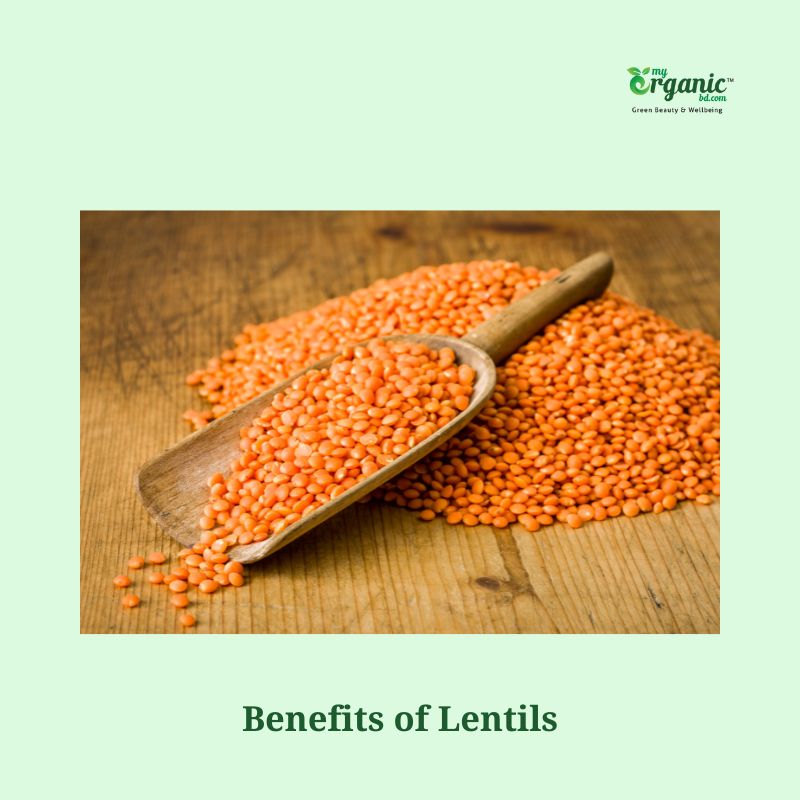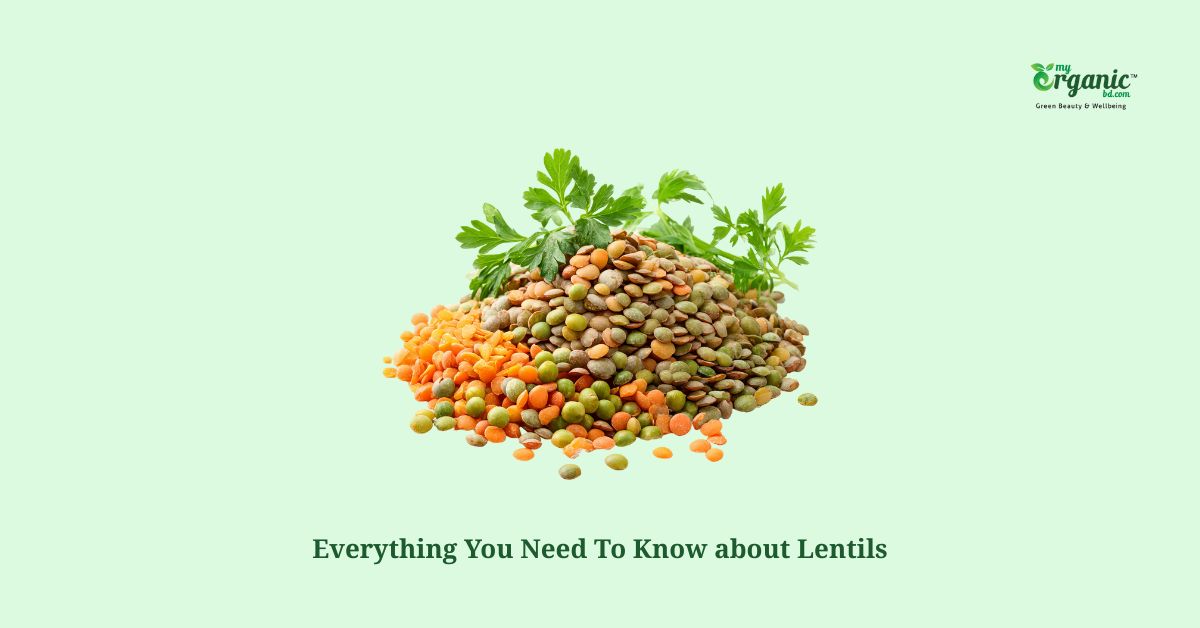Lentils are one of the earliest crops humans started to cultivate. It is very common in Indian and Mediterranean diets. This is becoming very popular for its health and wellness benefits. It is a great source of protein. Also contains vital nutrients like folate, iron, and potassium. It is full of fiber, and offers benefits for heart health, losing weight and more.
Hi, we are Team My Organic BD. We are a team of doctors, nutritionists, food microbiologists, and writers working together to make the most informative and easy-to-grasp article about organic healthy conscious living. With our cumulative effort and vast experience, we are pretty confident to present an excellent article about lentils.
In this article, we will discuss deeply about the nutritional profile and benefits of lentils. We will also answer all the questions and concerns people have about lentils. To keep it interesting, we include the history, uses, fun facts, and more.
Let’s start!

Are lentils a Superfood?
You may see people asking if this or that is a superfood. As if knowing a food as a superfood has more effect! Well, it’s true that how you feel about a food, affects your body. So, is lentils a superfood? Yes! Lentils can easily called superfoods. So, how can we claim it? You are right, there are no, universally accepted criteria for superfoods. But as we are working with organic healthy food, we created our logical system. Check out more What are the Basics of Superfoods? Benefits, Types, List & Uses.
In short, superfoods need to have at least one of 3 main characteristics— food with a variety of nutrients, food with rare nutrients in abundance, and food with special health-boosting ability. If a food has one or more of those characteristics, that can be called a superfood.
In this context, lentils come with a high amount of folate which supports cell development. It also contains a moderate amount of protein, fiber, iron, magnesium, and B vitamins. Lentils are low calorie, reduce blood sugar, and improve gut health. All traits indicate lentils as superfood. We will discuss in detail in the following parts.
What are the brief history of Lentils?
Lentils are one of the earliest domesticated plants by humans. It is believed that lentils were domesticated between 8000-9000 years ago. It was so culturally significant that it was even mentioned in the bible several times. Workers who made the pyramids, consumed lentils to sustain the hard labor. It was also in the staple diet in the Greek and Roman diets. It reached almost all parts of the world with global trade. In the Indian subcontinent, lentils are one of the primary components. It is the largest source of plant protein in the Indian diet. It is also an important part of Jewish tradition. Compared to other protein sources, lentils are quite affordable. In many famines and wars throughout history, it was a crucial source of protein. In modern times lentils remained one of the cornerstones of agriculture, economy, and wellness. People from many parts of the world still suffer from malnutrition. Lentils are recognized as one of our tools to fight malnutrition in underdeveloped regions.
What are the Nutritional Facts of Lentils?
Here are the nutritional facts about 100 grams of lentils.
- Calories: 230
- Carbs: 39.9 grams
- Protein: 17.9 grams
- Fiber: 15.6 grams
- Fat: 0.8 grams
- Folate: 90 mcg
- Iron: 6.6 mg
- Phosphorus: 180 mg
- Magnesium: 36 mg
- Potassium: 369 mg
- Zinc: 3.3 mg
- Niacin (Vitamin B3): 2.1 mg
- Pantothenic Acid (Vitamin B5): 1.2 mg
A brief explanation of Nutrients
Let’s discuss about the nutrients concise below –
Calories: Lentils can be a decent source of calories. It comes with a moderate amount of healthy calorie which can provide you energy for workout or daily work. Compared to other food sources, it keeps fuller for a longer time.
Carbs: In 100 grams of lentils you can find about 40 grams of carbohydrates which is quite high compared to other legumes. But don’t worry, the carbohydrates it contains are complex sugar that breaks down slowly and do not increase blood sugar which is the main concern about carbs those days. It also contains soluble and insoluble fiber which plays an essential role in reducing the insulin release in the blood limiting the blood sugar.
Protein: This superfood is one of the best plant based protein. In 100 grams of pulse you can get about 17 grams of protein. It is a lot compared to other vegan protein sources. Protein is one of the vital components which builds and repairs muscle, tissues, and various hormones and enzymes. It can enhance recovery and muscle buildup which makes it an ideal affordable food for those who are aiming for muscle building.
Fiber: One of the best things about lentils is its rich fiber profile. It contains about 15 grams of fiber in every 100 grams, which is about 60% of daily fiber requirements. The superfood contain both soluble and insoluble fiber. Soluble fiber reduces blood sugar, and cholesterol levels and improves gut health. On the other hand, insoluble fiber adds bulk to the stool and improves digestive health. Compared to other food, 100-gram whole grain rice contains 1.8 grams and apple contains about 2.4 grams of fiber.
Fat: They are a low-fat food, containing 0.8 grams of fat which is very insignificant.
Folate: 100 grams of lentils contains 90 mcg of folate or vitamin B9. It is a vital component for DNA synthesis and cell development. It also prevents neural tube defects during pregnancy. Folate also plays an important role in enhancing brain health and aids tissue repair and growth. It improves mood and brain function by maintaining the neurotransmitters. Lastly, folate is also vital for cardiovascular health.
Iron: It provide 6.6 mg of iron per 100 grams. It is over 100% of the daily iron requirement. Iron is one of the main components of hemoglobin which aids the transport of oxygen. It also improves the absorption of vitamin C from food. Also prevents diseases like anemia. Iron is essential for healthy skin, nails, hair, and brain function.
Phosphorus: Legumes are a good source of phosphorus providing about 26% of the daily requirement of phosphorus. It is a key component of hydroxyapatite which supports bone and teeth. Phosphorus also actively helps in energy production, cellular repair, and maintaining the pH balance in the body.
Potassium: It contain a small amount of potassium. Potassium is a vital nutrient for the proper electrolyte balance in the body, muscle function, and recovery. It also improves nerve signals and prevents the risk of kidney disease and cardiovascular disease.
Zinc: They contain 1.3 mg of Zinc which is about 12 percent of the daily zinc requirement. Zinc plays a key role in the immune system, DNA, and protein Synthesis.
Copper: Beans are one of the richer sources of copper. 100 grams of lentils contains about 56% of the daily copper value. Copper is vital for healthy red blood cells and the immune system. It also contributes to the maintenance of healthy bones and blood vessels.
Manganese: These provide about 25% of the daily requirements of manganese. It is a vital component for enzyme function and metabolism. It also contributes to bone formation, reducing inflammation, and the blood clotting process.
Thiamine (Vitamin B1): Legume contain 17% of the daily required amount of thiamine. It supports carbohydrate metabolism, nerve function, skin, and muscle health.
Niacin (Vitamin B3): This superfood contain a small amount of vitamin B3. It is important for energy production, healthy skin, and digestive system.
Vitamin B6: 100 grams of beans provides about 14% of daily required vitamin B6. It is a crucial component for protein metabolism and the healthy function of neuro transmitters. It also supports red blood cell production, brain health, and immune function.
Pantothenic Acid (Vitamin B5): It contain a small amount of pantothenic acid. It helps in fats and protein metabolism and supports the synthesis of red blood cells.

What are the proven health benefits of Lentils?
We already hints many benefits in the previous nutrient explanation. Lets discuss the proven health benefits of legumes here :
Hair
They have amazing potent for hair growth and wellness. It may boost the hair density and scalp condition in many ways. It is rich in iron which improves the oxygen supply in the hair follicles. The folate supports red blood cell production. It can reduce the symptoms of hair thinning. Lentils also have powerful antioxidants that reduce the oxidative stress in the scalp. Protein is the building block of hair. It provide a good amount of protein and amino acids which have a role in hair protection and growth.
Digestion
It contains a high amount of soluble and invaluable fiber which can support digestion in several ways. It promotes regular bowel movement. The insoluble fibers boost the gut health by feeding the gut bacteria. Fiber also helps to slow down the carbohydrate breakdown which helps to minimize the blood sugar. Fiber also minimizes the chance of colon cancer and other digestive system diseases. However, consuming too many lentils may cause diarrhea and abdominal discomfort.
Heart health
It have excellent heart health trait. May improve the function of the heart and also protect from chronic heart disease. One study with 39 people found that eating ⅓ cup of lentils per day can significantly lower the level of bad cholesterol (LDL). Increase the amount of HDL which is good cholesterol. By doing these it is one of the best food for heart health. Animal studies also indicate that pulse may also reduce blood pressure which is beneficial for heart health. Protein in the lentils can stop the pathway of blood vessels shrinking. This can play an important role in reducing blood pressure. They are full of folate, which is a vital nutrient for safe pregnancy. Deficiency of folate also increases levels of homocysteine which increases the risk of heart disease. Obesity is another major reason for heart disease. Lentils keep you full for longer and reduce food cravings. This is how it may also contribute to lowering the risk of heart disease indirectly.
Weight Loss
Lentils contain lower calories than many other foods. It can also help your weight loss journey in many ways. Its high fiber contents that keep you full for longer, reduces your food craving. It contains complex carbohydrates with low GI (36). With its high-quality carbs and protein, it makes an ideal food for losing weight. The protein also protects you from losing muscle in the weight loss process. It also contains many essential nutrients protecting you from malnutrition.
Antioxidants
These are usually known for their protein content. But it also contain a good amount of antioxidants. It is high in polyphenols and other powerful antioxidants which protect the cell from oxidative stress. Oxidative stress gives birth to several complicated health problems. It causes premature aging by damaging the skin tissues. Long years of oxidative damage make you more prone to heart disease. It may also cause chronic diseases like cancer. The lentils can provide a good amount of antioxidants to your healthy diet.
Cancer Protection
These pulses contain strong and diverse types of antioxidants and selenium. Those elements can play a vital role in cancer prevention. Antioxidants protect the cell from free radicals which can damage cells and DNA increasing the chance of cancer-causing mutation. The Selenium of lentils decreases the chance of tumor formation. It is also necessary for the production of T cells which is necessary for a healthy immune system.
Blood Sugar
These contain complex carbohydrate that takes longer to digest. Due to its slower digestion process, it releases sugar in the blood slowly. As it has a low glycemic index of 32-38 it can be a great source of healthy carbohydrates. Lentils also contain a good amount of soluble fiber. Soluble fiber can minimize insulin release and sugar spikes in the blood. This can be highly beneficial for people who are at risk of type 2 diabetes. The protein of pulse also helps to balance blood sugar and insulin sensitivity.
Disadvantage of Lentils
Lentils is usually well tolerated by most people. But it may cause some complications for some individuals especially due to overconsumption. These pulses are rich in fiber and eating too much may cause digestive problems like gas, bloating, etc. This pulses have some components that may work as an antinutrient. Consuming this in a large amount for a long time may cause a deficiency in few nutrients. These contain trypsin inhibitors that can block the protein-breaking enzymes in your body. However, lentils contain a low amount of it. Some components can bind to the carbohydrates of our gut wall. Consuming too much may cause a condition called leaky gut. There is also some evidence that overeating pulses may cause autoimmune disease for few individuals. However, the study is not enough to fully support the claim. These also contain tannins, which bind with protein and limit the absorption of certain nutrients. Soaking lentils removes a significant amount of tannins.

Healthy Recipe
Uses
Lentils are widely used across cultures in different ways and thousand recipes. Let’s start with the basic one. Soaked lentils are a great meal for breakfast or before exercise. It is often used in soups and stews. In Indian and Bengal culture dal is a popular healthy recipe that they take with rice and veggies. You can add it to curries, or vegan burgers. Fried lentils are also great for different types of spicy snacks. It is quite versatile and you can easily combine it with other dishes. You will find thousand healthy recipes online.
Taste of Pulse
Cooked lentils have a distinctly warm, earthy, and mild flavor. Very tasty. Soaked pulses have a nutty texture and taste, with their mild earthy flavor. It is hard to eat a lot of soaked lentils at once as it reduces your appetite a bit. Combining it with yogurt and lemon make it more delicious.
Natural Lentils in the Wellness Industry?
In the current wellness industry, lentils are not something people like to take as supplement. It is also not that popular as a wellness-boosting food. However, with the help of popular diet influencers, pulses are becoming popular as a superfood. It is more appealing to people who are looking for affordable protein sources. Lentils received great love from vegans as a great plant-based alternative to meat. It is the best vegan protein source.
Future of Pulse in Human Civilization
In the future, food like lentils have great importance for humanity. We are between a population explosion and it is getting worse every year. In this situation, there will be an unavoidable crisis of nutrient-rich food in different parts of the world. Animal proteins have a long list of problems for the environment. So, we will have to depend on better nutrition-rich foods like lentils. Near or long future, it is a great plant based protein.
FAQ: Detailed
Here are the top questions people frequently ask on the internet about this superfood.
Is it healthy to eat lentils every day?
Yes, lentils can be a healthy item in your everyday diet. It is an excellent source of dietary fiber and rich protein.
Are lentils carbs or protein?
Lentils have a good amount of both carbs and protein. Its good complex carbohydrate help you full longer without sugar spikes. Also This is an excellent source of plant protein.
Are lentils good for the skin?
Yes, These have a good amount of antioxidants and vitamins which are beneficial for your skin health. Some people also use pulse paste as a face pack for skin care.
What is the best time to eat lentils?
In the morning before you start your workout is the best time to eat lentils. It will provide necessary energy for your exercise and a good amount of protein.
How long to soak lentils?
Soaking overnight is enough to make it absorb water and become softened to edible.
Which lentil is best for skin whitening?
Regular lentils can help you brighten your skin. It contains antioxidants and phytochemicals that may help to make your skin brighter.
Do lentils cause gas?
They are very rich in soluble and insoluble fiber which may cause gas or digestive issues when overconsumed. Moderation is the key.
Is lentil good for weight loss?
Yes, it can be an excellent option for your weight loss diet. It contains 230 calories per 100 grams but has a low glycemic index, it will help you feel full longer. The plant based protein prevent muscle loss during your weight loss journey.
Can I eat pulses every day?
Yes, you can eat lentils every day without any issues. But you must keep the proper amount in your mind. Eating too much may cause digestive issues.
Can I eat lentils while fasting?
Yes, it can be an excellent option for eating before and after fasting. Remember fried pulse foods may cause digestive and health issues.
Is lentil good for hair?
Yes, lentils have a range of nutrients that offer hair nourishment. Protection hair from damage. It comes with protein, iron, zinc, calcium, potassium, B vitamins, and antioxidants that can benefit hair health.
How many pulse to eat per day?
About 60 grams of lentils is a good amount for getting all its nutrients while avoiding complications like gas and bloating.
Do boiling lentils remove protein?
No, boiling the lentils does not remove their protein. Boiling may reduce some of the antioxidants.
Are lentils healthier than eggs?
Comparing eggs and pulse nutritional diversity, lentils are healthier than eggs. However, both are healthy and part of a balanced diet.
Are lentils a prebiotic?
Yes, lentils are amazing prebiotic due to its fiber content. The fiber nourish the gut bacteria which improves our digestive health.
Conclusion
Lentils may not be the superstar of the wellness industry. But certainly this superfood have great benefits for human health and wellness. We make a detailed and helpful presentation about this amazing super protein.
Want to learn more healthy foods for wellness? Check out Superfoods for wellness : An Honest Guide for Beginners.
Mr. Shariful Alam Pavel believes in natural living. To live a healthy conscious living, we need to eat green, live green. MyOrganic Bd is a green wellbeing brand, educating millions to live a better life with mother nature.
- Shariful Alam
- Shariful Alam
- Shariful Alam
- Shariful Alam
- Shariful Alam
- Shariful Alam
- Shariful Alam
- Shariful Alam
A Microbiologist, full time Content writer in MyOrganic Bd relentlessly trying people aware green lifestyle. Apart from working MyOrganic, he is an Environmental activitist.
- Digbijoy Azad
- Digbijoy Azad
- Digbijoy Azad
- Digbijoy Azad
- Digbijoy Azad
- Digbijoy Azad
- Digbijoy Azad






